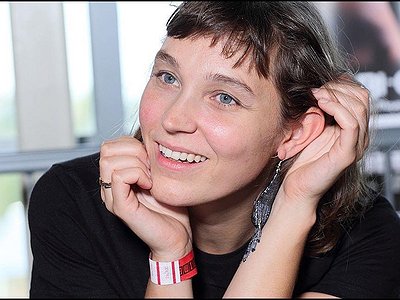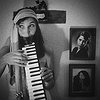Part 2
Could you take us through a day in your life, from a possible morning routine through to your work? Do you have a fixed schedule? How do music and other aspects of your life feed back into each other - do you separate them or instead try to make them blend seamlessly?
The only routine that’s survived quarantine is teaching piano afternoons. When all this started I made a goal of putting together a classical program of all pieces in D, a couple Beethoven sonatas, a partita, a set of Rachmaninov variations, so I’ve sort of invented a regimen of working on those.
Some days I don’t believe music is important, or that art is necessary, and so I focus on my mind-body or just cook. I think those days are as productive as the “productive” ones.
Could you describe your creative process on the basis of a piece or album that's particularly dear to you, please? Where did the ideas come from, how were they transformed in your mind, what did you start with and how do you refine these beginnings into the finished work of art?
CHIROMANCER has been my favourite the last four years because we co-write everything except lyrics by improvising and using patterns and improv games. When we started, our goal was just to practice the hardest music we could make up. We never booked shows for a year until one fell in our lap. We had about 25 minutes of unfinished songs, so we cooked hard for a month and that first show turned out.
But that music, it’s so hard it’s never finished. After all this time I still can’t memorize some of the complicated rotating patterns, especially if I have to do 3 or more of them at once. I think that’s another reason why it thrills me.
There are many descriptions of the ideal state of mind for being creative. What is it like for you? What supports this ideal state of mind and what are distractions? Are there strategies to enter into this state more easily?
I think there is no ideal state of mind for being creative we just have to carve out time to work and set our course in a direction and it’ll come. My simple rule to facilitate work and eat before you play. Rest, health, and enough brain space to allow ideas to surface will facilitate on their own. As I mentioned before, I’m also a big proponent of absence, breaks. Work it hard, take a walk. Sleep on it. Our brains do incredible math with or without our consent.
How is playing live and writing music in the studio connected? What do you achieve and draw from each experience personally? How do you see the relationship between improvisation and composition in this regard?
Improvisation is impossible to separate from composition, and sometimes reaches the level of live composition, if we are flexible and thoughtful enough. Live, I feel finely the balance between wanting to be free and wanting to stay in control of my performance. In the studio I feel free to be wild, since editing exists, but lose that charge from doing something dangerous in front of an audience.
Sometimes something comes out of you that astonishes you. To me, this is the strongest drug.
How do you see the relationship between the 'sound' aspects of music and the 'composition' aspects? How do you work with sound and timbre to meet certain production ideas and in which way can certain sounds already take on compositional qualities?
When I was studying formal composition, I fully gave in to my obsession with sound. At that point I’d commissioned handmade mallets of various materials to strike strings, and I was experimenting with all kinds of ways to safely manipulate the sound of the piano. I’d begun playing improvised inside piano shows.
I began incorporating my experiments creating indeterminate partials and using extended techniques into my written work to mixed reviews from most of my professors, and the more I married the well-tempered and “noise”, the less difference I saw between improvisation and through-composed new music. So after, I found a much weirder school went on to spend two years there researching, composing, and performing around the concept that sounds and silence are themselves compositions.
Our sense of hearing shares intriguing connections to other senses. From your experience, what are some of the most inspiring overlaps between different senses - and what do they tell us about the way our senses work? What happens to sound at its outermost borders?
I take pleasure from a holistic approach to the interplay of the senses. I feel most fully realized as an artist when what sound I create brings all my perception, internal and external, into one space. I love making additive work, the components of which create a product greater than the sum of its parts.
I am a spectral composer/performer, and I love to exploit psychoacoustic properties of instruments and spaces.
The most inspired I have ever been by the confluence of hearing and general perception was during my project Drone Church, for pipe organ and two amplified celli. We played one note, sometimes including its harmonic components, for long stretches of time, attempting various dynamic trajectories. I genuinely believe it changed and healed our brains and bodies, and those of our audiences. Droning regularly for more than an hour became like a meditation of the spirit, but the slight pitch differentials created scintillating compositions within the listeners absolutely unique to their own hearing. It was electric, and I hope to raise it again one day.
I can’t say what happens at the end of perception of sound. I have been fed unto tears by noise, field recordings, or the sound of someone practicing in the next building. When I think about the border, I fall back on an intuition that what we perceive and feel and receive are all connected, all one experience.
Art can be a purpose in its own right, but it can also directly feed back into everyday life, take on a social and political role and lead to more engagement.
Can you describe your approach to art and being an artist?
For me art is mostly commentary, no matter how abstract it’s a choice to say something. In this sense I have no approach, only a range of genre-driven commentary.
For a band I’ll write a song disparaging a despot, or noticing an ironic act of a lover, for improvisers I might ask everyone only to react to those with whom they’re making eye contact. I think the greater responsibility of artists is to point out something. For example, I have a difficult time hanging with tautological pop juggernauts whose music is about selling their music so that they can sell more of their music.
It is remarkable, in a way, that we have arrived in the 21st century with the basic concept of music still intact. Do you have a vision of music, an idea of what music could be beyond its current form?
To put it crudely, gear is getting smaller and smaller and, to my delight and amazement, the world is more and more accepting of the entire frequency spectrum see Oneohtrix Point Never.
I’m actually quite sad to notice a trend of people in North America losing interest in ability and craft, which is observable if one wanted to see conversations about music theory or the merits of various Balkan meters on TV. I may not be reasonable about this since it’s like the 24th year of teaching piano.
I imagine we’ll still have shredders, since the rest of the world hasn’t stopped practicing, but I bet generally everything will get more electronic, even more fashion-oriented, and more about sensations one can create in the body in a live setting.






